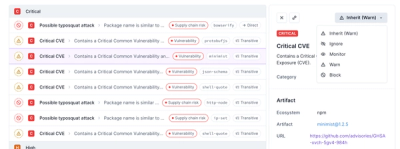
Research
Security News
Malicious npm Package Typosquats react-login-page to Deploy Keylogger
Socket researchers unpack a typosquatting package with malicious code that logs keystrokes and exfiltrates sensitive data to a remote server.
nativescript-plugin-firebase
Advanced tools
Changelog
3.5.0 (2016, August 9)
If version numbers changed, clean your platform folders to avoid build errors.
Readme

Google's realtime app platform (Database, Authentication, Configuration, Notifications) firebase.google.com
For readability the supported features have been moved to their own README's:
Head on over to https://console.firebase.google.com/ and sign up for a free account.
Your first 'Firebase' will be automatically created and made available via an URL like https://n-plugin-test.firebaseio.com.
Open your Firebase project at the Google console and click 'Add app' to add an iOS and / or Android app. Follow the steps (make sure the bundle id is the same as your nativescript.id in package.json and you'll be able to download:
iOS: GoogleService-Info.plist which you'll add to your NativeScript project at app/App_Resources/iOS/GoogleService-Info.plist
Android: google-services.json which you'll add to your NativeScript project at platforms/android/google-services.json
If you rather watch a video explaining the steps then check out this step-by-step guide - you'll also learn how to
add iOS and Android support to the Firebase console and how to integrate anonymous authentication:

From the command prompt go to your app's root folder and execute:
tns plugin add nativescript-plugin-firebase
And do yourself a favor by adding TypeScript support to your nativeScript app:
tns install typescript
Then open references.d.ts in the root of your project and add this line to get autocompletion and type-checking for this plugin:
/// <reference path="./node_modules/nativescript-plugin-firebase/firebase.d.ts" />
Install packages 'Google Play Services' and 'Google Repository' in your Android SDK Manager
app/App_Resources/Android/app.gradleapplicationId yet please add it to the defaultConfig node so it becomes:android {
...
defaultConfig {
applicationId = "your.package.name"
...
}
}
platforms/android/build.gradleclasspath "com.google.gms:google-services:3.0.0" so it becomes something like: dependencies {
classpath "com.android.tools.build:gradle:1.5.0"
classpath "com.google.gms:google-services:3.0.0"
}
apply plugin: "com.google.gms.google-services"If you want a quickstart, clone our demo app.
We need to do some wiring when your app starts, so open app.js and add this before application.start();:
var firebase = require("nativescript-plugin-firebase");
firebase.init({
// Optionally pass in properties for database, authentication and cloud messaging,
// see their respective docs.
}).then(
function (instance) {
console.log("firebase.init done");
},
function (error) {
console.log("firebase.init error: " + error);
}
);
import firebase = require("nativescript-plugin-firebase");
firebase.init({
// Optionally pass in properties for database, authentication and cloud messaging,
// see their respective docs.
}).then(
(instance) => {
console.log("firebase.init done");
},
(error) => {
console.log("firebase.init error: " + error);
}
);
On the simulator you may see this message if you have more than one app with the Firebase SDK ever installed:
[FirebaseDatabase] Authentication failed: invalid_token (Invalid claim 'aud' in auth token.)
or
[FirebaseDatabase] Authentication failed: invalid_token (audience was project 'firegroceries-904d0' but should have been project 'your-firebase-project')
This is a known issue in the Firebase SDK. I always use a real device to avoid this problem, but you can pass an 'iOSEmulatorFlush' option to init.
firebase.init({
// Optionally pass in properties for database, authentication and cloud messaging,
// see their respective docs and 'iOSEmulatorFlush' to flush token before init.
iOSEmulatorFlush: true
}).then()
If you see an error like Unable to satisfy the following requirements: Firebase (~> 3.3.0) required by Podfile,
then check issue 98 which perfectly explains how to update your local Pod spec repo.
com.android.dex.DexIndexOverflowException: method ID not in..
Congrats, you ran into this issue
which can be solved by adding multiDexEnabled true to your app/App_Resources/Android/app.gradle
so it becomes something like this:
android {
defaultConfig {
applicationId = "__PACKAGE__"
multiDexEnabled true
generatedDensities = []
}
aaptOptions {
additionalParameters "--no-version-vectors"
}
}
Increase the Java Max Heap Size like this (the bit at the end):
android {
defaultConfig {
applicationId = "__PACKAGE__"
multiDexEnabled true
generatedDensities = []
}
aaptOptions {
additionalParameters "--no-version-vectors"
}
dexOptions {
javaMaxHeapSize "4g"
}
}
Another possible error is "FirebaseApp with name [DEFAULT] doesn't exist." which will be solved by
placing google-services.json to platforms/android/google-services.json (see above), and making
the changes to build.gradle which are mentioned above as well.
And there's this one: "Could not find com.google.firebase:firebase-auth:9.4.0". That means
making sure you have the latest Google Repository bits installed.
Just run android from a command prompt and install any pending updates.
Update your Android bits like the issue above and reinstall the android platform in your project.
removeEventListenerThe starting point for this plugin was this great Gist by John Bristowe.
FAQs
Unknown package
The npm package nativescript-plugin-firebase receives a total of 370 weekly downloads. As such, nativescript-plugin-firebase popularity was classified as not popular.
We found that nativescript-plugin-firebase demonstrated a not healthy version release cadence and project activity because the last version was released a year ago. It has 1 open source maintainer collaborating on the project.
Did you know?

Socket for GitHub automatically highlights issues in each pull request and monitors the health of all your open source dependencies. Discover the contents of your packages and block harmful activity before you install or update your dependencies.

Research
Security News
Socket researchers unpack a typosquatting package with malicious code that logs keystrokes and exfiltrates sensitive data to a remote server.

Security News
The JavaScript community has launched the e18e initiative to improve ecosystem performance by cleaning up dependency trees, speeding up critical parts of the ecosystem, and documenting lighter alternatives to established tools.

Product
Socket now supports four distinct alert actions instead of the previous two, and alert triaging allows users to override the actions taken for all individual alerts.